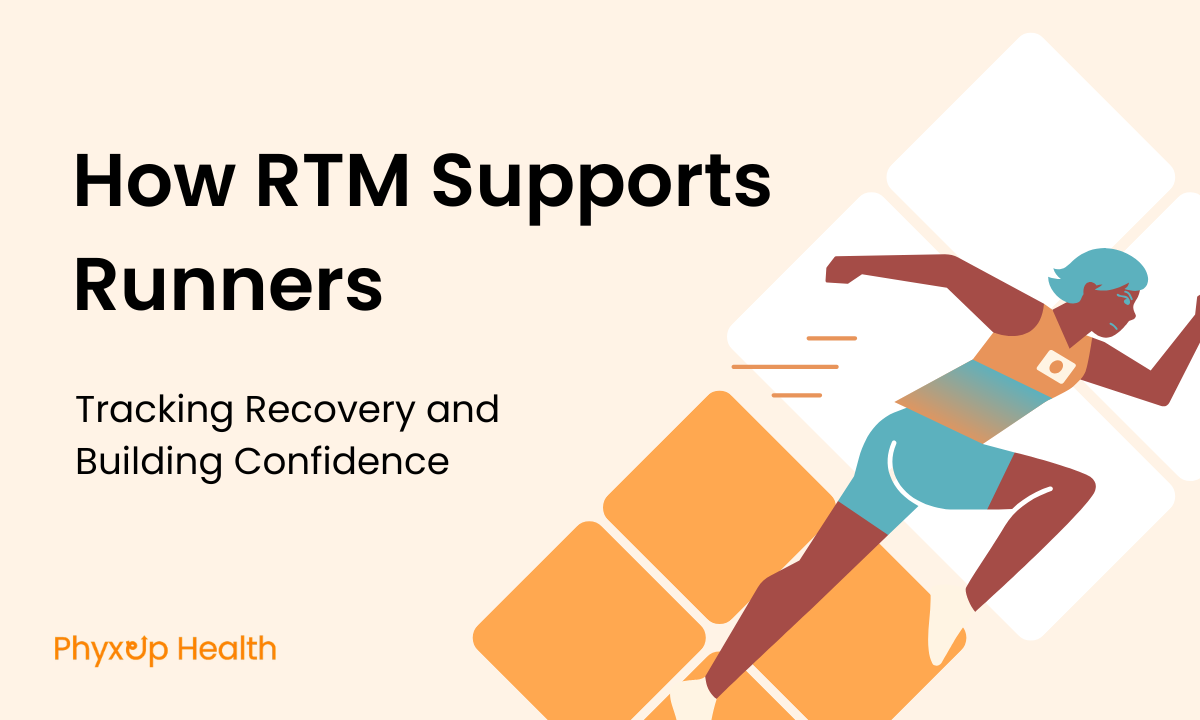How RTM Supports Runners: Tracking Recovery and Building Confidence

When you work with runners in physical therapy, you quickly notice how driven they are. They thrive on structure, consistency, and results. But recovering from a running injury can test even the most dedicated athlete’s patience. Every day away from the track can feel like a setback, and the desire to get back to training often clashes with the slower pace of healing.
Runners are usually excellent patients. They follow their exercise programs, stay active, and are motivated to get better. Yet the mental side of recovery is just as challenging as the physical one. Frustration builds when progress feels slow. Anxiety creeps in when they worry about losing fitness or getting hurt again. These emotional hurdles can be just as real as the injury itself.
The Unique Challenges of Runner Recovery
Runners face a combination of physical and mental barriers during rehabilitation:
⏰ Time and patience
With their training schedules and competitive mindset, runners often want to speed through recovery. Too much downtime can chip away at their motivation and confidence.
✍️ Keeping track of symptoms
Pain and discomfort can be tricky to interpret. A runner might dismiss a warning sign or fail to mention it, which can delay healing or lead to bigger problems later.
🤕 Risk of recurring injuries
Without consistent guidance, the risk of re-injury is high. Returning to training too quickly or skipping key steps in the plan can lead to the same injury flaring up again.
What Runners Need in Their Treatment Plan
To help runners return to their sport safely and confidently, their physical therapy plan should be more than a standard set of exercises. It needs to be tailored to the unique demands of running and the mindset of athletes who are eager to get back on their feet.
1. Ongoing support and feedback
Runners bounce back best when they’re not going it alone. Regular check-ins with their care team keep them on track and motivated, while also catching small issues before they turn into setbacks. That extra layer of guidance matters because runners are often eager to jump back into training and competition. Without steady feedback, it’s easy to push too hard and end up with a brand-new injury or a repeat of the old one.
2. Targeted exercises for specific injuries
Most running injuries come from overuse or muscle imbalances, so a good rehab plan zeroes in on the exact muscles and movement patterns that need attention. When every exercise is chosen to tackle the root cause of the injury, runners recover not just faster, but stronger—and with the confidence to hit the ground running again
3. A recovery plan that builds confidence
Physical healing is only part of the journey. Runners need to trust their bodies again. A well-structured program gives them the confidence to return to training without fear of another setback. When they believe in their recovery plan, they are more likely to stick with it and avoid re-injury.
Game Plan for Recovery with RTM
Recovering from a running injury takes more than just rest and a few exercises. Runners need consistent monitoring, clear feedback, and treatment plans that match their drive to get back on the road. Remote Therapeutic Monitoring (RTM) makes this possible by connecting clinics and athletes between visits, creating a recovery process that feels seamless, supported, and personalized.
Smarter Progress Tracking
With RTM, physical therapists can track recovery details that matter most for runners, even when they are away from the clinic. Sleep quality, pain levels, and day-to-day progress are no longer a mystery—they’re visible in real time.
How RTM helps your runners:
📲 Apple Health sync: Activity levels, vitals, and recovery trends are automatically pulled from a runner’s device for instant insights.
🗓 Daily check-ins: Quick pain surveys help therapists adjust plans before a small issue turns into another setback.
📊 Clear progress snapshots: Both patient and PT can see how recovery is moving forward, making the process feel steady and encouraging.
Personalized Recovery Plans that Match Runner Motivation
Runners are motivated, often asking, “Can I do more?” Instead of waiting until the next clinic session, RTM allows therapists to respond quickly and keep that motivation channeled into safe, effective recovery.
- 🏋️♀️ Customizable treatment plans: Assign exercises, stretches, and educational content based on each individual runner's needs from our native HEP library, or feel free to create your own personalized plans.
- ⏱ Real-time adjustments: Data-driven insights allow PTs to modify treatment plans directly, ensuring your runner is on the right track to recovery that matches their own speed and specific needs.
- 🏡 At-home engagement: Access to online interactive content allows runners to stay engaged, motivated, and active, turning at-home recovery into an easily accessible experience that brings confidence to their recovery.
- 💡 See Your Progress: Daily symptom tracking and interactive feedback let you celebrate milestones and spot patterns, keeping motivation high and recovery on track.
Streamlined Recovery for Runners (and for Clinics)
RTM isn’t just for athletes, it makes life easier for your therapist too so they can spend more time on doing what matters: treating patients. RTM platforms powered by AI don’t just track data; they make it actionable and easy to manage. Instead of adding more work, AI automates the details so therapists can focus on care.
For PTs, this results in:
- Improved patient outcomes and loyalty: By proactively adjusting programs and providing timely feedback, runners feel supported and are more likely to complete their rehab successfully
- Use RTM Without Extra Staff or Time: With real-time insights into patient adherence and progress, you can focus your in-person visits on targeted interventions rather than routine check-ins
- Streamlined billing and reimbursement: RTM can organize all patient activity and therapist input into ready-to-use documentation. SOAP notes and CPT code-based billing reports are automatically generated, streamlining the reimbursement process
For runners, it means that their therapist can spend more time monitoring and adjusting their treatment plan, leading to less uncertainty, fewer setbacks, and a smoother transition back to the field.
Empower Your Practice to Help Runners Recover Faster
Running season is here, and with it comes a rise in overuse injuries and patients seeking physical therapy. RTM gives your clinic a smarter way to care for runners while improving engagement, outcomes, and patient loyalty.
With RTM, your runners can:
✅ Stay engaged and confident even outside of clinic hours
✅ Follow video-based exercises anytime, at home or on the go
✅ Receive personalized adjustments based on their recovery progress
✅ Feel fully supported throughout their rehab
Why your practice should use PhyxUp Health:
💡 Smarter Workflows – Reduce administrative work and spend more time helping runners get back on track.
💻 Seamless Integration – Fits directly into your existing EMR/EHR workflow.
👷♂️ HIPAA-Compliant Security – Keep patient data safe while monitoring progress remotely.
💸 Built-In Billing – Track and bill CMS-approved RTM codes automatically, creating a sustainable revenue stream.
📊 Transparent Results – Dashboards show exactly how RTM improves patient outcomes and practice efficiency.
🙌 Full-Service Support – From patient onboarding to managing check-ins, PhyxUp scales with your clinic’s needs with a team of in-house licensed therapists that manages the platform for you
With PhyxUp Health, your clinic can deliver personalized, accountable care, helping runners recover faster, prevent reinjury, and build long-term trust—all while growing your practice’s impact and revenue.
